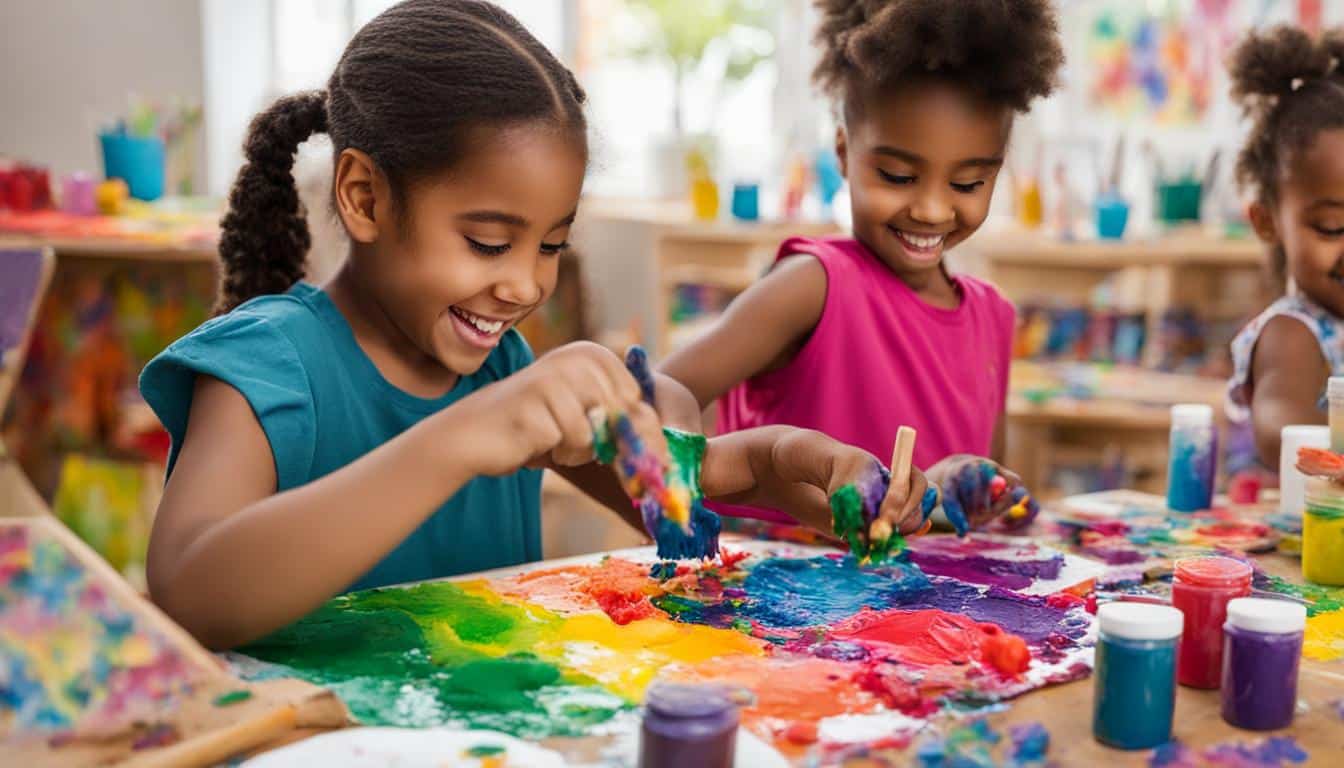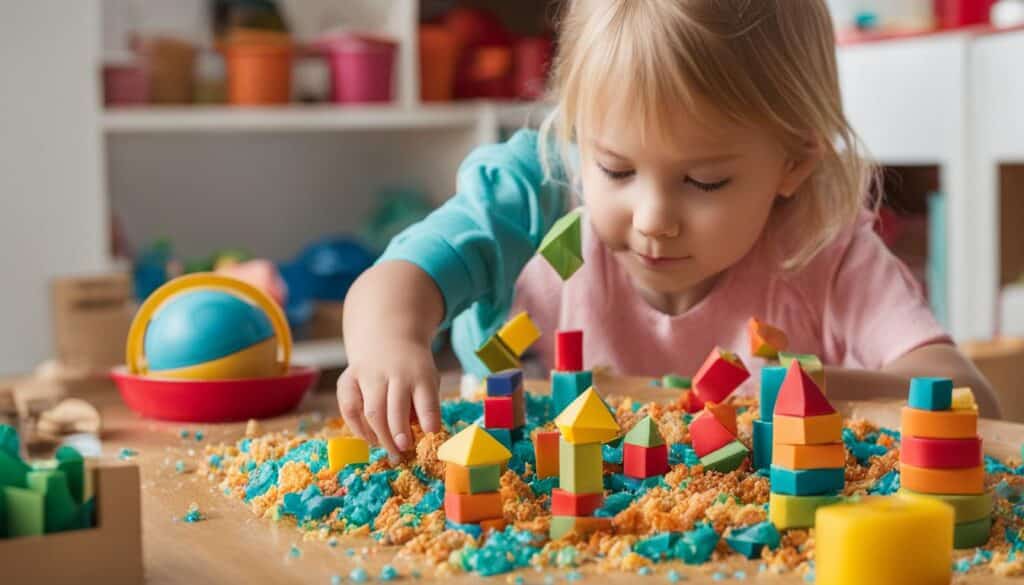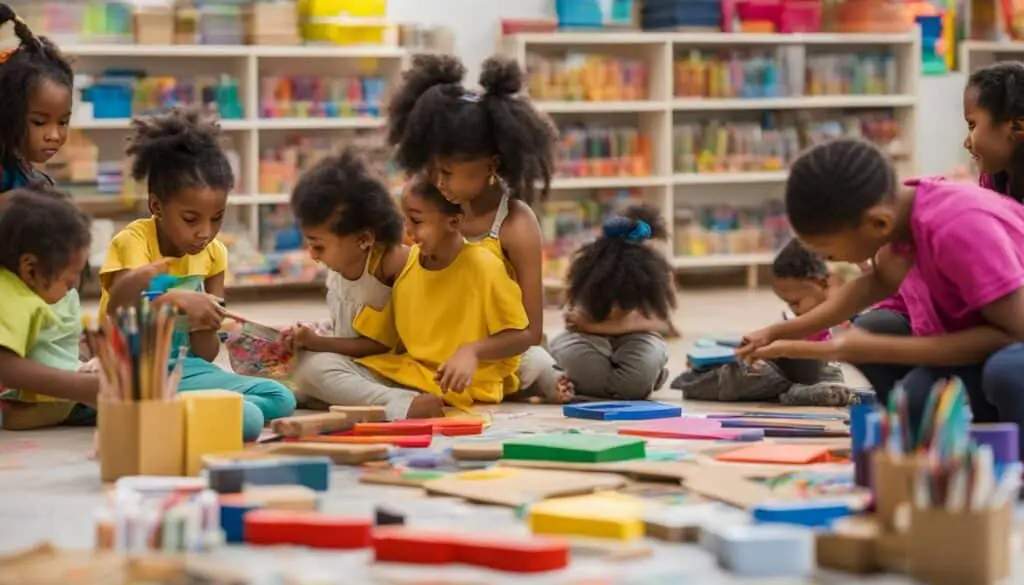
Nurturing Creativity in Early Childhood: Tips and Activities
As a professional in early childhood development, I cannot overstate the importance of nurturing creativity in young children. Providing opportunities for them to explore their imagination and express themselves through art, music, and play is vital for their overall growth and development. In this section, we will discuss some tips and activities that can help foster creativity in early childhood.
Research has shown that children who engage in creative activities at an early age are more likely to excel academically, socially, and emotionally. Encouraging children to think outside the box and come up with new and innovative ideas can help them develop critical thinking and problem-solving skills that they will carry with them into adulthood.
Whether you are a parent, teacher, or caregiver, there are many ways you can inspire young minds to explore their creative potential. From setting up an art corner in the classroom to taking a nature walk and creating art from found materials, there are countless opportunities for children to express themselves and develop their creativity.
Key Takeaways:
- Engaging in creative activities in early childhood can have a significant impact on a child’s cognitive, emotional, and social development.
- Providing a supportive environment that encourages exploration and experimentation is crucial for fostering creativity.
- Simple activities such as storytelling, music and movement, and art projects can provide endless opportunities for children to express themselves creatively.
- Nurturing creativity in early childhood can help children develop critical thinking and problem-solving skills that will serve them well in all aspects of their lives.
- Creativity is not just limited to the arts but can also apply to problem-solving and innovation in all fields.
Understanding the Importance of Nurturing Creativity
In early childhood, nurturing creativity is critical as it plays a significant role in a child’s overall development. Creativity helps children channel their imaginations, leading to numerous benefits that aid in their cognitive, emotional, and social growth. By providing opportunities to unleash their creativity, children develop critical thinking skills, problem-solving abilities, and innovative thinking. It also gives them a platform to express themselves and their emotions freely, enhancing their emotional intelligence and their capability to connect with others.
“At a young age, children’s brains are malleable, and fostering creativity creates new connections and neurons in their brains, laying the foundation for a life full of learning and exploration.”
As children grow, nurturing creativity helps them become more confident, self-aware, and curious about the world around them. Research shows that children who engage in creative activities at an early age might be more successful in their academic and professional lives.
Creative thinking is increasingly valued in today’s society, with industries and businesses seeking innovative individuals who can bring fresh ideas to the table. By fostering creativity in early childhood, we are nurturing future innovators and critical thinkers who are well-equipped to tackle the challenges of our ever-changing world.
Strategies to Foster Creativity in Early Childhood
Encouraging creativity in young children is a crucial aspect of their development and should be fostered from an early age. Here are some practical strategies that parents, teachers, and caregivers can implement to inspire creativity in children:
Create a Supportive Environment
The environment in which a child grows significantly influences their imagination and creativity. Ensure that the child has access to stimulating materials such as art supplies, books, and toys that nurture exploration and experimentation. Inspire a child’s creativity by exposing them to different experiences and providing a safe space to express their ideas freely.
Encourage Imaginative Play
Imaginative play allows children to explore different scenarios and express ideas in a way that comes naturally to them. Encourage children to engage in pretend play such as building forts, playing dress-up, or creating imaginary characters. Join in the play and support their imagination.
Promote Exploration and Experimentation
Foster creativity by encouraging children to explore the world around them and try new things. Provide opportunities for them to experiment with different materials, take part in creative projects and participate in activities that allow them to make choices and solve problems creatively.
Use Open-Ended Questions
Use open-ended questions such as “What if?” and “How can we?” to encourage children to think outside the box, express their ideas, and explore possibilities. These types of questions help them develop critical thinking skills and expand their creativity.

“Curiosity about life in all of its aspects, I think, is still the secret of great creative people.” -Leo Burnett
Fun and Engaging Activities to Inspire Creativity
Encouraging creativity in young children can be fun and easy with the right activities. Here are some hands-on ideas to ignite their imagination and help them express themselves:
Art and Craft Projects
| Activity | Materials |
|---|---|
| DIY musical instruments | Cardboard boxes, rubber bands, paper plates |
| Painting with everyday objects | Sponges, leaves, forks, straws |
| Crafting with recycled materials | Egg cartons, bottle caps, paper rolls |
Art and craft projects are a fun way for children to explore their creativity and develop fine motor skills. Encourage them to use their imagination and experiment with different materials to create unique masterpieces.
Music and Movement Exercises
- Create a dance party
- Play a game of freeze dance
- Imitate animal movements
Music and movement exercises can help children develop rhythm, coordination, and self-expression. Make it fun by incorporating their favorite songs and encouraging them to be creative with their dance moves.
Storytelling
“Once upon a time, there was a magical kingdom filled with talking animals and enchanted forests…”
- Make up a story together
- Act out a favorite fairy tale
- Draw a picture of a story character
Storytelling is a great way to stimulate imagination and language skills in young children. Encourage them to use their creativity and come up with their own characters and settings to make the story unique.
These are just a few examples of activities that can inspire creativity in early childhood. Remember, the key to nurturing creativity is to provide an environment that encourages exploration, experimentation, and self-expression. With these activities, children will have fun while learning and developing their creative potential.

Conclusion
In conclusion, I firmly believe that nurturing creativity in early childhood is crucial for a child’s holistic development. By providing children with a supportive environment, encouraging imaginative play, and promoting exploration and experimentation, we can help them unlock their full potential and thrive.
As we have discussed in this article, fostering creativity in early childhood has numerous benefits, including enhancing a child’s problem-solving skills, boosting their confidence, and enhancing their joy for learning. By embracing and nurturing creativity early on, we can set children up for a lifetime of success and well-being.
I hope that the tips and activities we have shared in this article will be helpful for parents, teachers, and caregivers who are looking to inspire and encourage young minds to explore their creative potential. Remember, every child has a unique imaginative spark waiting to be kindled. Let us do our part to ensure that spark becomes a bright flame that illuminates their lives for years to come.
FAQ
Why is nurturing creativity in early childhood important?
Nurturing creativity in early childhood is important because it lays the foundation for a child’s overall development. Creative thinking fosters problem-solving skills, enhances imagination, and promotes a love for learning. It also helps children express themselves, build confidence, and develop vital social and emotional abilities.
How can I foster creativity in my child?
There are several strategies you can use to foster creativity in your child. First, create a supportive environment by providing them with open-ended materials, such as art supplies and blocks, and giving them the freedom to explore and experiment. Encourage imaginative play by providing props and allowing for unstructured playtime. Finally, praise their creative efforts and celebrate their unique ideas, fostering a sense of pride and self-expression.
What are some fun activities to inspire creativity in early childhood?
There are numerous activities that can inspire creativity in young children. You can engage them in art and craft projects, such as painting, sculpting, or collages. Music and movement exercises, such as dancing or creating their own songs, can also spark their imagination. Storytelling activities, where children can create their own stories or act them out, are another great option. The key is to provide a variety of hands-on and open-ended activities that encourage exploration and self-expression.
How does nurturing creativity benefit a child’s overall development?
Nurturing creativity in early childhood has numerous benefits for a child’s overall development. It enhances their critical thinking and problem-solving abilities, promotes cognitive development, stimulates imagination, and improves emotional intelligence. Additionally, it helps children develop confidence, resilience, and adaptability, as they learn to think outside the box and approach challenges with creativity and innovation.